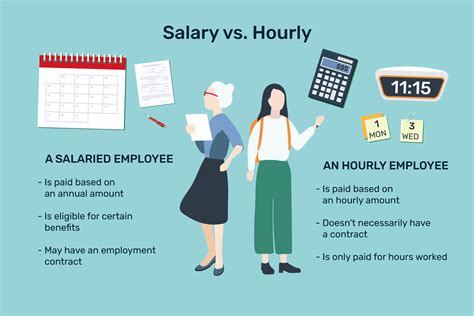Transitioning From Hourly To Salaried Employment: What To Expect

Transitioning from hourly to salaried employment is a significant move in your career. It means you’re moving from being paid by the hour to being paid a set salary. This change can come with a lot of questions and uncertainties. In this article, we’ll cover everything you need to know about transitioning from hourly to salaried employment.
What is Salaried Employment?
Salaried employment is a job where you receive a fixed salary for a set period, usually a year. Salaried employees are usually paid the same amount regardless of the number of hours worked, unlike hourly employees who are paid based on the number of hours worked. Salaried employees are also usually given benefits such as health insurance, paid time off, and retirement benefits.
Why Transition from Hourly to Salaried Employment?
There are several reasons why you might want to transition from hourly to salaried employment:
- Steady income: With a fixed salary, you know exactly how much money you’ll be making each month, regardless of the number of hours worked.
- Benefits: Salaried employees are usually given benefits such as health insurance, paid time off, and retirement benefits.
- Career growth: Salaried positions usually come with more responsibilities and opportunities for career growth.
- Job security: Salaried positions are usually more stable and secure than hourly positions.
What to Expect When Transitioning from Hourly to Salaried Employment
1. Change in Pay Structure
As a salaried employee, you’ll receive a fixed salary each pay period. This means that your pay won’t fluctuate based on the number of hours worked. You’ll also be paid on a regular schedule, usually bi-weekly or monthly.
2. Benefits
Salaried employees are usually given benefits such as health insurance, paid time off, and retirement benefits. Make sure to review your employment contract and benefits package to see what benefits you’re eligible for.
3. Overtime Pay
Salaried employees are usually exempt from overtime pay, which means that you won’t be paid extra for working overtime. However, some salaried positions are still eligible for overtime pay, so make sure to review your employment contract to see if you’re eligible.
4. Work Hours
Salaried employees are usually expected to work more than 40 hours per week, and may be required to work weekends or holidays. Make sure to review your employment contract to see what your work hours are.
5. Job Responsibilities
Salaried positions usually come with more responsibilities and opportunities for career growth. Make sure to review your job description and employment contract to see what your job responsibilities are.
6. Job Security
Salaried positions are usually more stable and secure than hourly positions. However, it’s important to review your employment contract to see what your job security is like.
7. Taxes
As a salaried employee, your employer will withhold taxes from your paycheck. Make sure to review your paycheck and tax forms to ensure that the correct amount of taxes are being withheld.
8. Communication with Employer
It’s important to communicate with your employer about any questions or concerns you have about transitioning from hourly to salaried employment. Make sure to review your employment contract and job description, and reach out to your employer if you have any questions or concerns.
9. Time Management
As a salaried employee, you’ll need to manage your time effectively to ensure that you’re meeting your job responsibilities. Make sure to prioritize your tasks and manage your time effectively to ensure that you’re meeting your job responsibilities.
10. Work-Life Balance
It’s important to maintain a healthy work-life balance as a salaried employee. Make sure to prioritize your personal time and take breaks when needed to prevent burnout.
FAQs
1. Will I still be paid for overtime as a salaried employee?
Most salaried employees are exempt from overtime pay, but some salaried positions are still eligible for overtime pay. Make sure to review your employment contract to see if you’re eligible for overtime pay.
2. Will I receive benefits as a salaried employee?
Yes, salaried employees are usually given benefits such as health insurance, paid time off, and retirement benefits. Make sure to review your employment contract and benefits package to see what benefits you’re eligible for.
3. Will my work hours change as a salaried employee?
Yes, salaried employees are usually expected to work more than 40 hours per week, and may be required to work weekends or holidays. Make sure to review your employment contract to see what your work hours are.
4. How do I manage my time effectively as a salaried employee?
To manage your time effectively as a salaried employee, make sure to prioritize your tasks and manage your time effectively to ensure that you’re meeting your job responsibilities.
5. How do I maintain a healthy work-life balance as a salaried employee?
To maintain a healthy work-life balance as a salaried employee, make sure to prioritize your personal time and take breaks when needed to prevent burnout.
Conclusion
Transitioning from hourly to salaried employment can be a significant change in your career. It’s important to understand what to expect when transitioning to ensure that you’re prepared and comfortable with the change. By understanding the differences between hourly and salaried employment, managing your time effectively, and maintaining a healthy work-life balance, you can make a successful transition to salaried employment.
